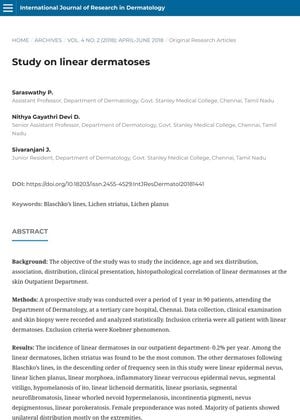Study on Linear Dermatoses
April 2018
in “
International Journal of Research in Dermatology
”

TLDR Linear skin conditions are rare, more common in females, and often misdiagnosed without tissue analysis.
The study conducted over a year involved 90 patients with linear dermatoses at a tertiary care hospital in Chennai. The incidence of linear dermatoses was found to be 0.2% per year. Among these, lichen striatus was the most common, followed by linear epidermal nevus, linear lichen planus, linear morphoea, and others. Most of these linear lesions were arranged along Blaschko’s line. The study found a higher prevalence in females and most patients showed unilateral distribution, primarily on the extremities. The study emphasized the importance of histopathological correlation, as some cases clinically diagnosed as one condition showed histopathological features of another. For instance, cases diagnosed as lichen striatus showed features of psoriasis and linear epidermal verrucous nevus. Very few associations were noted.





